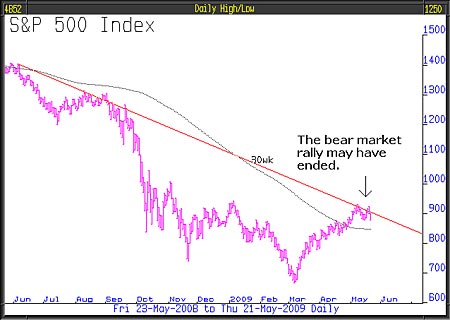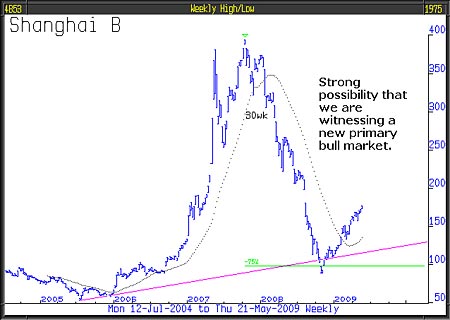Get the latest financial news, insights and expert analysis from our award-winning MoneyWeek team, to help you understand what really matters when it comes to your finances.
You are now subscribed
Your newsletter sign-up was successful
Want to add more newsletters?

Twice daily
MoneyWeek
Get the latest financial news, insights and expert analysis from our award-winning MoneyWeek team, to help you understand what really matters when it comes to your finances.

Four times a week
Look After My Bills
Sign up to our free money-saving newsletter, filled with the latest news and expert advice to help you find the best tips and deals for managing your bills. Start saving today!
On Wednesday 13th May, the Bank of England warned that the "green shoots" now visible in the economy could wither as private sector banks might not have sufficient lending capacity to fuel the recovery. Disregarding most of the optimism in financial markets and business surveys, Mervyn King judged that both the short term and longer term outlook for growth had deteriorated since February - the future, he said, was highly uncertain. His comments, as Ben Broadbent of Goldman Sachs said, were more pessimistic about lending than three months ago Mr Broadbent thinks that's quite perverse. We think Mervyn King knows, from his position, a few things that even Goldman's don't know.
The minutes of the Fed meeting held on 28th29th April saw "significant downside risks" to the outlook for the US economy, saying that the global financial system was still "vulnerable" to further shocks. The Fed also surprised the market by scaling down their outlook for the US economy and scaling up their outlook for unemployment.
We are embroiled in a 'quite different' recession than most that have gone before it is a balance sheet recession, financial and non-financial companies and households collectively have balance sheets with fractured asset values and elevated debt the aftermath of the credit bubble bursting. A large number find themselves in such difficulty that they must deleverage a process that will take years and inhibit future investment. For this reason, banks are hoarding cash whilst non-financial companies and households look to pay down debt and increase savings. Such a backcloth, for asset values, is about as daunting as it can get and for our money is one of the reasons why stock markets have no likelihood of recovering in the near term. FTSE's rally from March this year is almost certainly doomed to fail, if it hasn't already.
MoneyWeek
Subscribe to MoneyWeek today and get your first six magazine issues absolutely FREE

Sign up to Money Morning
Don't miss the latest investment and personal finances news, market analysis, plus money-saving tips with our free twice-daily newsletter
Don't miss the latest investment and personal finances news, market analysis, plus money-saving tips with our free twice-daily newsletter

To view the recent stock market rally as the start of a new long term primary bull market makes no sense, especially bearing in mind that banks are unwilling to lend, a condition that is likely to continue, unemployment continues to rise and companies continue to cut dividends and issue new equity. Under these circumstances, is it likely that corporate earnings can meaningfully grow? - a fundamental necessity if the stock market is to return to primary bull market conditions.
Sentiment was further aggravated by the latest US housing figures. Housing starts in April fell to the lowest level since 1959, down 12.8%, permits were also down 3.3% and according to the National Association of Realtors, for the first quarter 2009, house prices were down 13.8% compared to 2008.
The model portfolio owns a Chinese equity fund. In spite of our bleak view of the developed world's stock markets, it is quite possible that certain emerging markets might still offer huge opportunities; nonetheless, we are carefully monitoring progress. We are in an interesting situation. In 2007 after the stock markets peaked, it was considered by many that emerging markets would be unaffected. That was absolutely wrong, global trade came to a standstill and emerging markets collapsed - they suffered more than the developed world's stock markets. If FTSE has returned to full scale decline, the bear market rally having terminated, then we will have to study the emerging markets' response. For the time being, our investments in China and energy are providing a balance to portfolios. However, one of our long term investment mantras is to "adjust to change".

Until the credit bubble burst, the huge story was wildly irresponsible, excessive leveraging everywhere. The bursting of that credit bubble was inevitable; as a consequence, we are now living through deleveraging and debt deflation. What, might you ask, is the next big story? It is governments' debt-to-GDP ratios, a subject covered by Woody Brock of Strategic Economic Decisions Inc., in his most recent essay entitled The End Game Draws Nigh - Future Evolution of the Debt-to-GDP Ratio[pdf]. We are posting this essay on our website as it is important that as many as possible should read it.
This article was written by Full Circle Asset Management ,as published in the threesixty Newsletter on 22 May 2009
Get the latest financial news, insights and expert analysis from our award-winning MoneyWeek team, to help you understand what really matters when it comes to your finances.
MoneyWeek is written by a team of experienced and award-winning journalists, plus expert columnists. As well as daily digital news and features, MoneyWeek also publishes a weekly magazine, covering investing and personal finance. From share tips, pensions, gold to practical investment tips - we provide a round-up to help you make money and keep it.
-
 Should you buy an active ETF?
Should you buy an active ETF?ETFs are often mischaracterised as passive products, but they can be a convenient way to add active management to your portfolio
-
 Power up your pension before 5 April – easy ways to save before the tax year end
Power up your pension before 5 April – easy ways to save before the tax year endWith the end of the tax year looming, pension savers currently have a window to review and maximise what’s going into their retirement funds – we look at how

